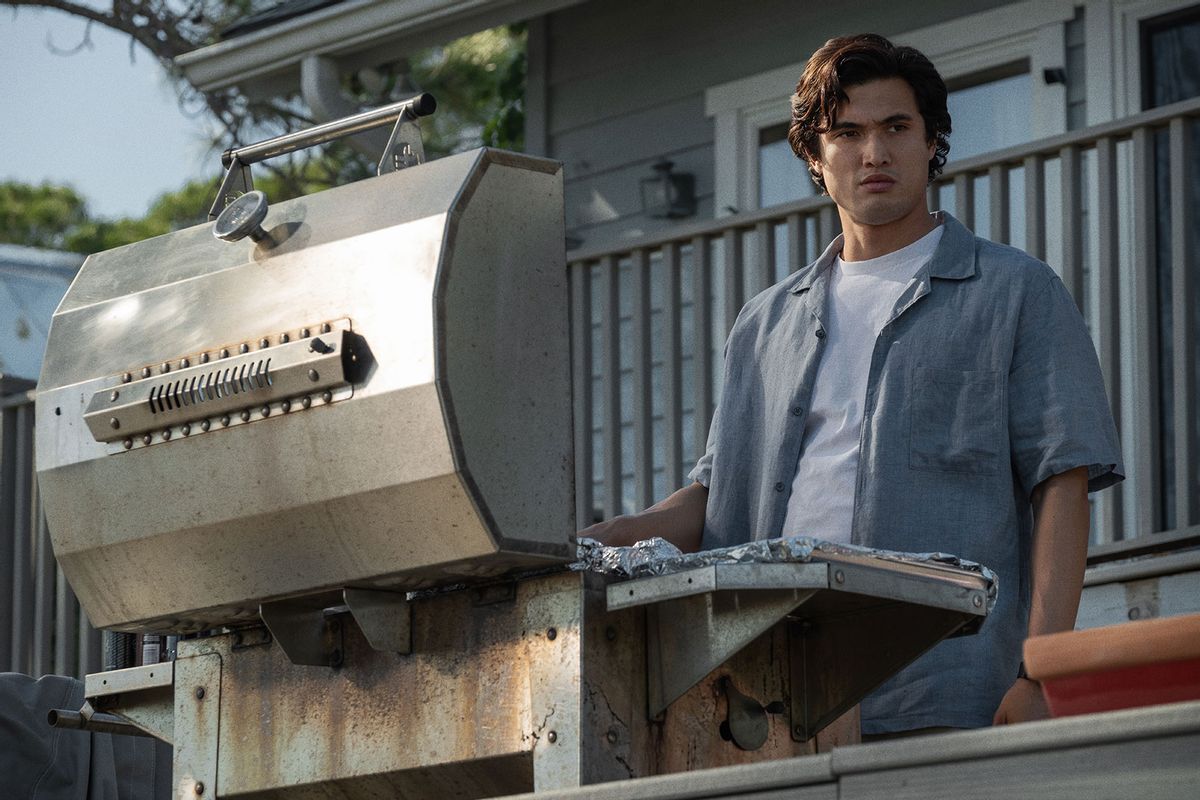Power comes in all shapes and sizes — but how one wields the power is at the center of Todd Haynes' intriguing drama "May December."
In Netflix's darkly comic social commentary, a middle-aged Gracie (Julianne Moore) and her younger husband Joe (Charles Melton) invite well-known actress Elizabeth (Natalie Portman) into their home as she researches the couple. Elizabeth is interested in telling their story for her new film in which she will portray Gracie.
Gracie and Joe's relationship is inspired by the real-life relationship that began between 35-year-old teacher Mary Kay Letourneau and her 12-year-old student Villi Fualaau. The scandal was the stuff of tabloid fodder for years, and Letourneau went to prison for statutory rape. "May December" reimagines the story between a 36- and 13-year-old, respectively, with the illicit affair taking place in a pet shop's storeroom. Like Letourneau, Gracie also spent time in prison for rape, and afterward married her victim and had children with him.
As Elizabeth researches the couple, Gracie and Joe's relationship is presented as loving and otherwise unremarkable, but it's soon clear that it's a deeply unhealthy and unbalanced dynamic. As a child, Joe couldn't resist Gracie, and that has carried over into his adulthood. When Elizabeth comes along, similar patterns play out between her and Joe even though they're chronologically the same age. "May December" shows how Joe never stood a chance against these women, who had innate power based on their background and identity, and were practiced at wielding it to get their own way.
The power of privilege
 Julianne Moore as Gracie Atherton-Yoo and Natalie Portman as Elizabeth Berry in "May December" (Courtesy of Netflix/François Duhamel)Letourneau was the daughter of a chemist mother and politician father, a U.S. Congressman who once ran for president. While Gracie is loosely based on Letourneau, not much is revealed about Gracie's background other than the fact that she has many protective brothers (just like her real-life counterpart). However, despite her housewife cosplay, it's clear by the lifestyle she maintains that money is coming from somewhere, most likely her powerful parents. Joe's meager salary as an X-ray technician can hardly afford their sprawling estate in Savannah, Georgia. And Gracie's homemade cake business is more of a hobby than a source of any real income. In fact, Gracie's former lawyer confides in Elizabeth that his wife is one of the few people who consistently orders cakes from Gracie because they feel bad for her. That expression of pity is just one of the many examples of how the Savannah community rallies around and supports Gracie, despite her notoriety. Her influential and no doubt affluent roots have seen to that.
Julianne Moore as Gracie Atherton-Yoo and Natalie Portman as Elizabeth Berry in "May December" (Courtesy of Netflix/François Duhamel)Letourneau was the daughter of a chemist mother and politician father, a U.S. Congressman who once ran for president. While Gracie is loosely based on Letourneau, not much is revealed about Gracie's background other than the fact that she has many protective brothers (just like her real-life counterpart). However, despite her housewife cosplay, it's clear by the lifestyle she maintains that money is coming from somewhere, most likely her powerful parents. Joe's meager salary as an X-ray technician can hardly afford their sprawling estate in Savannah, Georgia. And Gracie's homemade cake business is more of a hobby than a source of any real income. In fact, Gracie's former lawyer confides in Elizabeth that his wife is one of the few people who consistently orders cakes from Gracie because they feel bad for her. That expression of pity is just one of the many examples of how the Savannah community rallies around and supports Gracie, despite her notoriety. Her influential and no doubt affluent roots have seen to that.
Despite her housewife cosplay, it's clear by the lifestyle [Gracie] maintains that money is coming from somewhere.
Meanwhile, Elizabeth is the child of two academics and is a longtime entertainment industry veteran, which comes with its own influence. Throughout "May December," she is recognized everywhere she goes from just about anyone — old, young, men, women and children. It changes the way people see her and grants her a certain level of access – and leeway – in Savannah. When she visits the local high school's drama class, she inppropriately answers a question about sex scenes – going into excited detail to the minors listening, alternately enraptured or disgusted. The teacher is clearly uncomfortable but doesn't feel empowered to stop or reproach Elizabeth. At another point in the film, she attends a family dinner out celebrating the graduation of Gracie and Joe's twins. Is it germane to her research? No . . . but she's invited anyway and gets to sit at their table, unlike the family from Gracie's previous marriage who gets invited to the restaurant but is relegated to the back.
Elizabeth's power also extends to getting the movie about Gracie and Joe made, and judging from her phone calls with the director, she's the one really calling the shots. As she drags out her time in Savannah all in the name of research, the director reminds her that she's been there too long, which puts the film over budget. Her glib response? The wrap gifts for the crew can be downgraded to something cheaper to make up the financial difference.
Unlike Gracie and Elizabeth, Joe doesn't come from a privileged background and never had a chance to gain any sort of influence in the community before he became embroiled in scandal as a child. His father, a Korean American man, lives alone in a modest apartment, and most likely immigrated to the U.S. and had to start from scratch. There's no generational wealth on display here.
Furthermore, when Joe was growing up without a strong parental presence at home, he had to step up and raise his two sisters, one of whom had severe asthma. He wasn't afforded a comfortable and responsibility-free childhood. Between the damaging psychological effects of parentification and then becoming a teenage father in actuality, Joe didn't have time to focus on his own personal development. Since one can become an X-ray tech through a certification program, it's also probable that he didn't pursue higher education so he could spend time raising his kids. (His real-life counterpart Villi Fualaau dropped out of high school.)
The power of whiteness
 Elizabeth Yu as Mary Atherton-Yoo, Natalie Portman as Elizabeth Berry & Julianne Moore as Gracie Atherton-Yoo in "May December" (Courtesy of Netflix)Even though Gracie was in prison for the sex crimes committed against Joe, she isn't seen as a threat in her predominantly white high-middle-class community in Savannah because she's one of them. Sure, some anonymous person continues to send packages of poop to her house, but that hasn't stopped the community from backing her publicly. She is seen as a victim instead of a perpetrator, and really, how bad can she be if she's hosting barbeques for her friends and neighbors? It would have been difficult to imagine this level of support and camaraderie from the community had the races been flipped – with Gracie as a woman of color who victimized a white child. Instead, one Savannah neighbor urges Elizabeth to "be kind" in her portrayal of Gracie – you know, since she's suffered through so much already.
Elizabeth Yu as Mary Atherton-Yoo, Natalie Portman as Elizabeth Berry & Julianne Moore as Gracie Atherton-Yoo in "May December" (Courtesy of Netflix)Even though Gracie was in prison for the sex crimes committed against Joe, she isn't seen as a threat in her predominantly white high-middle-class community in Savannah because she's one of them. Sure, some anonymous person continues to send packages of poop to her house, but that hasn't stopped the community from backing her publicly. She is seen as a victim instead of a perpetrator, and really, how bad can she be if she's hosting barbeques for her friends and neighbors? It would have been difficult to imagine this level of support and camaraderie from the community had the races been flipped – with Gracie as a woman of color who victimized a white child. Instead, one Savannah neighbor urges Elizabeth to "be kind" in her portrayal of Gracie – you know, since she's suffered through so much already.
In Elizabeth's case, her whiteness lets her enter into Gracie's world almost seamlessly. While it's true her fame also gains her entry, she doesn't stick out in the predominantly white community that is used to people who look like her. As she studies Gracie, it's easy for her to become the sex offender's mirror because the two share so much in common. Although it's not quite the same, this affords Elizabeth similar cachet in Savannah . . . and with Joe.
In contrast, Joe is relatively alone when it comes to racial identity, and therefore does not have that built-in community that Gracie has and even Elizabeth enjoys by proxy. The only other times we see other people of Korean descent are Joe's visits to his father and through Joe's three mixed children – all of whom are at odds with their own mother. Race is barely mentioned in the movie, but its effects are felt by the overwhelming, almost bland whiteness that overtakes everything and how the few people of color are all struggling against it. Of course Joe and his kids stand out, but to acknowledge that would mean acknowledging their differences in background. It's far easier to adopt an "I see no color" attitude to play at inclusion without actually embracing it.
Joe's race is mentioned only once. At the beginning of the film Gracie says she originally had noticed Joe because he and his family were the only Koreans in town. She had Othered them, fetishizing Joe when he was a child because he was different.
Director-writer Haynes said in an interview, “Joe’s otherness as a Korean-American is just one more aspect that makes the choice to seduce this young boy all the more fraught and transgressive.”
Being the only people of color in a majority white community usually leads to an urge to assimilate, and that means being of service, acting pleasant and non-threatening – nothing that would make one stand out and be targeted. It's easy to see how being the only South Korean boy in his neighborhood influenced Joe's reserved, quiet nature. He is subservient to Gracie and always shifting himself to meet her needs. He is a model husband and father so he doesn't receive any negative attention or criticism. And his children learn that they also must fall in line with Gracie's demands.
The power of gender stereotypes
 Natalie Portman as Elizabeth Berry, & Charles Melton as Joe Yoo in "May December" (Courtesy of Netflix)Gracie and Elizabeth are able to take advantage of Joe for one other reason: they're women. When it comes to sexual assault and harassment, the bitter irony in a patriarchal society is that when women are the perpetrators, the crimes are often dismissed or seen as impossible. Traditionally, women aren't seen as sexual aggressors – and even when they are able to take advantage of a boy or man, his arousal and sexual participation are interpreted as proof of consent. The victim himself may even believe this at first.
Natalie Portman as Elizabeth Berry, & Charles Melton as Joe Yoo in "May December" (Courtesy of Netflix)Gracie and Elizabeth are able to take advantage of Joe for one other reason: they're women. When it comes to sexual assault and harassment, the bitter irony in a patriarchal society is that when women are the perpetrators, the crimes are often dismissed or seen as impossible. Traditionally, women aren't seen as sexual aggressors – and even when they are able to take advantage of a boy or man, his arousal and sexual participation are interpreted as proof of consent. The victim himself may even believe this at first.
But of course, consent doesn't come into play when the person being taken advantage of is a child, no matter how much Gracie claims otherwise. During one stomach-turning scene, Joe questions if he was too young to have been a father. But Gracie tries to paint him as the aggressor who put this life into motion. "You seduced me," she declares and even demands, "Who was the boss?" referencing their dynamic . . . when he was only 13. The gaslighting doesn't stop there, and Gracie even goes so far as to portray him as more sexually experienced than herself. After all, she reasons, she grew up sheltered and was only married once before. In contrast, she points out that he's had previous relationships that clearly made him more experienced . . . again, when he was only 13.
No matter what she insists, Gracie established her power over Joe when he was a child, and that hasn't changed even though he's a 6-foot-1 man in his 30s towering over her. That's why he performs all the chores and runs all the errands she tells him to, while she puts on a front of the happy homemaker, uselessly baking cakes and arranging flowers. He's even her emotional support person, soothing her when she has a meltdown over a canceled cake order. She demands, and he gives.
 Julianne Moore and Charles Melton in "May December" (Netflix)
Julianne Moore and Charles Melton in "May December" (Netflix)
Elizabeth enters the picture with this dynamic already established. Joe is used to helping dominant women and being flattered by their attention. He is not used to advocating for himself simply because he never got a chance to become a fully realized adult after his traumatic, life-changing teenage experience. It's not terribly surprising then that as she begins to identify with Gracie, Elizabeth then seduces Joe. Is it more research or Method acting? It doesn't matter, as she almost immediately discards him after their tryst when he gives her valuable information needed to make her film. Even though they are both the same age, Joe isn't emotionally 36, as seen from his almost boyish glee after they have sex and then incomprehension when she describes the fling as merely "what adults do." Sadly, Joe has been conditioned to not be an adult by his own wife, but rather yield to her whims and dictates.
We need your help to stay independent
The lasting effects on Joe
From the need to assimilate to the way that he serves Gracie, Joe is constantly performing the role he's been instructed to play since he was a child. That means outwardly confirming that he's really in love with Gracie, that they have an enduring love story. His whole life would feel like a lie if he acknowledged what was actually true – that he was groomed by Gracie to meet her needs and hasn't ever developed his own personhood separate from her.
By the end of the film, he starts to have how own emotional breakdowns, questioning how he's spent the last 24 years. It's a different, twisted sort of empty nest syndrome that Joe realizes as his youngest children, the twins, are about to graduate from high school. Yes, as their primary caregiver, he'll miss them. But more importantly, their imminent absence reminds him of his own lost childhood. He hasn't had the crucial teenage experiences they've had that are a part of growing up.
In a simultaneously sad and funny scene, son Charlie treats his dad as a peer, giving Joe his first puff off a joint as they sit on their roof. Initially, Joe feels giddy, laughing and almost toppling off the side of the house. But that soon gives way to worry and grief as he tearfully tells Charlie he wants his kids to have the good life, free of the responsibilities he had to endure as an adolescent. Later at the twins' graduation, he breaks down again, sobbing while witnessing the milestone he didn't get to experience himself, regretting how his own bright future was stolen from him.
Both Gracie and Elizabeth had taken advantage of Joe, and because of these complex intersections of power, Savannah society reinforced their influence and Joe's helplessness. "May December" not only questions what abuse and abusers may look like, but it also challenges the systems in place that allow communities to ignore who's being hurt.
Read more
about this topic



Shares